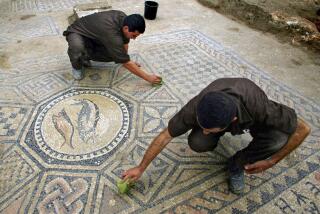A Monopoly That Deserves to Die : Huntington Library takes bold stand in Dead Sea Scrolls controversy
- Share via
The Huntington Library has decided to take on Israeli museum authorities in the matter of the Dead Sea Scrolls, and it is entirely right to do so. At stake is the ability and freedom of scholars to make sense of this biblical treasure and to enrich religious understanding.
More than four decades ago Bedouin tribesmen stumbled across and entered a cave in what is now the West Bank. What they found were ancient scrolls amounting to authoritative versions of nearly the entire Hebrew Bible, or Old Testament. These extraordinary documents first wound up in the hands of the Jordanian government, which granted exclusive research rights to a very small group of selected scholars.
But after the 1967 Mideast War, possession passed to Israel, which decided not to change that arrangement. The net effect was to institutionalize a stultifying research monopoly that for decades has frustrated scholars the world over.
Now, by a curious twist of fate, Huntington Library Director William A. Moffett has the opportunity to smash that monopoly. Ten years ago the famed San Marino library came into possession of virtually a complete set of photographs of the scrolls. Last weekend Moffett announced that he would be making copies of that collection available to scholars--and this is the point--without restriction.
The response from authorities in Israel has been quick and furious. But it simply has not been convincing. Officials from Jerusalem, where the original scrolls are housed and where they were photographed for the Huntington, insist that releasing the collection constitutes a breach of ethics and a violation of contract.
Huntington takes the position that the collection was photographed under circumstances that were outside the monopoly agreement and that it is the library’s high moral responsibility to scholarship and academic freedom to share its treasure. We concur.
More to Read
Sign up for Essential California
The most important California stories and recommendations in your inbox every morning.
You may occasionally receive promotional content from the Los Angeles Times.













